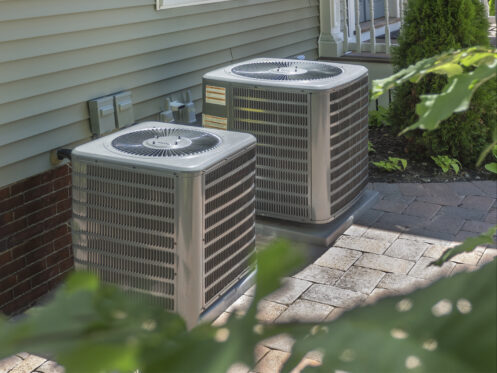A SEER rating is a measurement of the energy efficiency of your AC unit. As an acronym for Seasonal Energy Efficiency Ratio, the SEER rating denotes how effectively your air conditioner converts electricity into cooling power for a more comfortable home. Currently, the SEER rating range is 14 to 22.
The higher the SEER rating, the more efficient the air conditioner becomes in terms of how much power the unit needs to maintain preferred indoor temperatures. Because SEER ratings play a vital role in the performance of your AC unit throughout its lifespan, you need to understand how this measurement system works to your benefit.
An overview of SEER ratings can help you make an informed decision about the best air conditioner for your household.
What Determines the SEER Rating?
The SEER rating is a calculation of the efficiency of an air conditioner on a seasonal basis. Calculation of an air conditioner’s SEER rating derives from dividing the total cooling output of the unit by the power input required for operation. Professionals measure cooling output in British Thermal Units (BTUs) and measure power input in watts.
The Air Conditioning, Heating, and Refrigeration Institute (AHRI) helped establish the testing system for the SEER rating scale. Depending on the brand, SEER ratings currently range from 14 to 22. By standardizing this rating scale, SEER helps ensure accuracy and consistency regardless of manufacturer or model. Testing also takes into consideration the AC unit’s size and design, the type of refrigerant used, and typical regional climate or humidity levels.
You can find the designated SEER rating of your AC unit on the Energy Guide label attached to your air conditioner. It is also sometimes located near the manufacturer label close to the unit model and serial number. The U.S. Department of Energy provides oversight of SEER rating standards, and over 300 AC manufacturers across North America adhere to the SEER rating system.
For example, the Department of Energy passed its regulation in 2006 that all newly installed AC units should have a minimum SEER rating of 13. In 2015, the Department of Energy updated its regulation by raising the minimum SEER rating to 14 for AC units installed in homes located in states with the hottest summer climates. This standard remained in place until 2023.
What Are the Benefits of a High Seer Rating?
Higher SEER ratings translate into increased energy efficiency for air conditioning units. Potential benefits of choosing an AC with a high SEER rating include lower utility bills, reduced carbon footprint, tax rebates or incentives, and increased comfort.
Lower Utility Bills
A high SEER rating means your AC consumes less energy to keep your home cool during the hot season. Air conditioners with high SEER ratings can cool off the same space more quickly, reducing the time and power required to operate the system. By drawing less power from the grid, an efficient air conditioner can help lower utility bills. According to the Department of Energy, the average household may save between 20% and 40% on cooling expenses by replacing an inefficient AC with a high SEER-rated unit.
Reduced Carbon Footprint
Local power plants that generate electricity depend on fuel like coal or natural gas to create energy for the grid. This process can increase the emission of greenhouse gases that harm the ozone layer and pollute the local environment. High-efficiency units consume less energy and reduce the strain or necessary output from nearby power grids. This helps shrink your carbon footprint. Efficient AC models also tend to use updated refrigerants that release far fewer pollutants into the atmosphere.
Potential Tax Incentives and Rebates
Air conditioners with high SEER ratings are often eligible for local, state, or federal tax incentives and rebates. These programs may help make installing a new unit more affordable. For example, ENERGY STAR-certified AC units are eligible for a $600 tax credit from Jan. 1, 2023, through Dec. 31, 2032. Split systems should have a SEER rating of at least 16. Homeowners can check the Environmental Protection Agency’s ENERGY STAR website for more details. The site also has a rebate finding for locating other rebates and credits for your state or zip code.
Increased Comfort
Air conditioners with higher SEER ratings can offer better comfort during the summer than units with lower ratings. The reason is that high-efficiency systems tend to use two-stage or variable-speed cooling rather than single-speed operation.
A two-stage AC unit has a compressor that can operate at two distinct speeds. The lowest setting keeps your home cool in the summer with minimal fluctuations. This helps the unit use less energy. Variable-speed systems have multiple settings that adjust automatically to maintain the temperature in your home. This also reduces power-consuming fluctuations and helps conserve energy. Variable-speed appliances often have SEER ratings of 20 or higher.
SEER vs. SEER2 Ratings
On January 1, 2023, the U.S. Department of Energy again updated SEER ratings. The new standard is commonly known as SEER2. The SEER2 scale still uses the numerical rating system, but it has accurate testing conditions and demands more regulatory control for air conditioners installed in the hottest regions. For example, SEER2 ratings use an M1 testing procedure to simulate static pressure conditions as they would occur in the real world. This testing mimics the action of ductwork as it would perform in a typical residential setting. SEER2 also compiles regional climate data and factors like humidity to label units more accurately. The SEER2 standard applies to all new split-system air conditioners and single-package AC units in the United States. These standards require a minimum SEER rating of 14 for new air conditioners installed in the Northeast. Air conditioners installed in the Southeast must have a minimum 15 SEER or 14.3 SEER2 rating.
Other Considerations for SEER-Rated AC Units
If you are in the market for a new air conditioner, an HVAC company can assist you. The HVAC technician can help you weigh factors to determine the best SEER rating for your home and budget, and the HVAC company can also install your new unit to ensure that everything goes smoothly.
Look for Energy Star-Approved Units
Many homeowners look for ENERGY STAR-certified units in hopes of tax credits or rebates. While rebate requirements and credit amounts can vary, all ENERGY STAR-approved HVAC units must have a SEER rating of at least 14.5 to receive the ENERGY STAR label. Choosing a unit with this label can automatically ensure that you have purchased an efficient system. You can then determine whether you need a unit with a higher rating to meet additional rebate or tax credit requirements.
Consider the Investment
While you might be tempted to go for the lowest SEER-rated unit to save a little money, units with higher SEER ratings help you conserve more energy over time. This can help lower annual utility costs and save far more money in the long run. Hiring a professional for installation can also help save money by reducing the risk of errors or unexpected repairs.
Understand that Efficiency Declines With Age
HVAC units become less efficient as they age. Excessive usage, corrosion, high temperatures, humidity, and debris all affect unit efficiency over time. Never rely on the fact that you bought an efficient unit decades ago. If you purchased a unit 15-20 years ago with a 10 SEER rating, for example, it might have dropped to about a 7 SEER rating by now.
Invest in Annual HVAC Inspections
Regular HVAC inspections help maintain your AC unit’s efficiency. An HVAC technician can examine and test all components of your unit each year to ensure optimal performance.
Contact Us Today
The SEER rating is a crucial factor involved in deciding on the correct air conditioning unit. Fortunately, the experts can help. Cool Power LLC offers AC and cooling services for homes in Nassau, Long Island, Suffolk County, and surrounding areas.
We offer AC installation and air conditioner maintenance for your SEER-rated unit and work with ductless HVAC systems. In addition, we offer indoor air quality services and maintenance agreements. No matter the AC question, we have the answer. Contact Cool Power LLC today for all HVAC needs.


